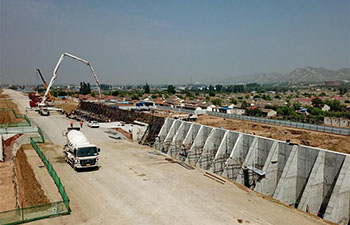STRASBOURG, June 14 (Xinhua) -- Members of European Parliament, gathered in Strasbourg for a plenary session, have adopted a new cyber defense resolution and supported closer strategic ties with NATO.
With 476 votes in favor, 151 against, and 36 abstentions, the cyber defense resolution adopted on Wednesday notes rising concerns about "hybrid threats," in which foreign entities use unconventional mixes of tactics in formations difficult to combat.
"A successful cyber attack can turn a nuclear power plant into a nuclear bomb or cause chaos in a hospital, putting patients' lives at risk," said European Parliament rapporteur Urmas Paet. "In order to defend ourselves from such threats, we need to strengthen cyber defense capabilities by boosting cooperation between Member States, the EU and NATO."
On the need for an EU-wide solution, Paet said: "Cybersecurity is international and interlinked so, if one member state is very weak, it could unfortunately harm all the others."
MEPs said in their resolution that fragmented defense strategies and capabilities add to cyber attack vulnerability.
The text of the resolution calls on leaders of the EU to enhance capabilities for military cooperation and to reinforce cyber defense cooperation at the EU-level, with NATO and other strategic partners.
The vote backs cyber initiatives already built into the Permanent Structured Cooperation (PESCO), the joint European defense mechanism that 25 EU member states signed and which was activated in December 2017, including an information-sharing platform for cyber incidents and cyber rapid response teams.
MEPs hope that these initiatives will lead to the creation of a European rapid response team to detect and counter cyber threats, as well as coordinating responses.
In a second resolution, MEPs urged, by 411 votes to 182, with 57 abstentions, that neither the EU nor NATO had the full range of tools necessary to manage new security challenges, which are increasingly unconventional and hybrid.
In addition to improved cooperation on cyber defense, the European Parliament called for the EU-NATO relationship to focus on strategic communication, counter-terrorism, situational awareness, classified information sharing, management of irregular migration and the facilitation of the swift movement of military personnel and assets within the EU.
The two non-legislative resolutions are non-binding, but establish strong support in the European Parliament for efforts to consolidate and reinforce shared European defense capabilities.

















